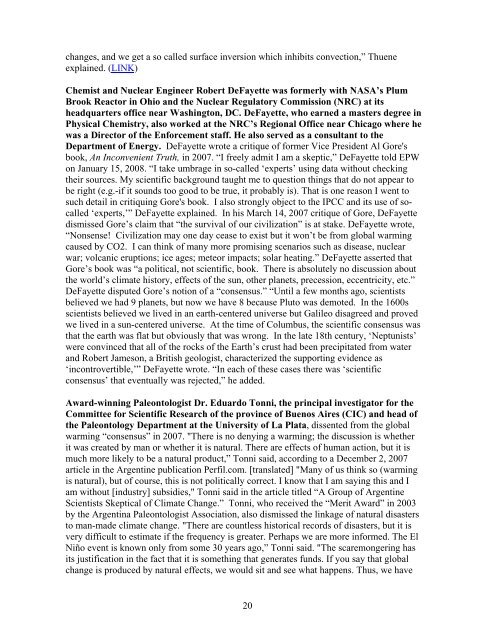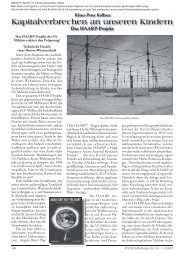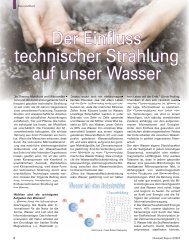U. S. Senate Minority Report: - Klimaforschung
U. S. Senate Minority Report: - Klimaforschung
U. S. Senate Minority Report: - Klimaforschung
You also want an ePaper? Increase the reach of your titles
YUMPU automatically turns print PDFs into web optimized ePapers that Google loves.
changes, and we get a so called surface inversion which inhibits convection,” Thuene<br />
explained. (LINK)<br />
Chemist and Nuclear Engineer Robert DeFayette was formerly with NASA’s Plum<br />
Brook Reactor in Ohio and the Nuclear Regulatory Commission (NRC) at its<br />
headquarters office near Washington, DC. DeFayette, who earned a masters degree in<br />
Physical Chemistry, also worked at the NRC’s Regional Office near Chicago where he<br />
was a Director of the Enforcement staff. He also served as a consultant to the<br />
Department of Energy. DeFayette wrote a critique of former Vice President Al Gore's<br />
book, An Inconvenient Truth, in 2007. “I freely admit I am a skeptic,” DeFayette told EPW<br />
on January 15, 2008. “I take umbrage in so-called ‘experts’ using data without checking<br />
their sources. My scientific background taught me to question things that do not appear to<br />
be right (e.g.-if it sounds too good to be true, it probably is). That is one reason I went to<br />
such detail in critiquing Gore's book. I also strongly object to the IPCC and its use of socalled<br />
‘experts,’” DeFayette explained. In his March 14, 2007 critique of Gore, DeFayette<br />
dismissed Gore’s claim that “the survival of our civilization” is at stake. DeFayette wrote,<br />
“Nonsense! Civilization may one day cease to exist but it won’t be from global warming<br />
caused by CO2. I can think of many more promising scenarios such as disease, nuclear<br />
war; volcanic eruptions; ice ages; meteor impacts; solar heating.” DeFayette asserted that<br />
Gore’s book was “a political, not scientific, book. There is absolutely no discussion about<br />
the world’s climate history, effects of the sun, other planets, precession, eccentricity, etc.”<br />
DeFayette disputed Gore’s notion of a “consensus.” “Until a few months ago, scientists<br />
believed we had 9 planets, but now we have 8 because Pluto was demoted. In the 1600s<br />
scientists believed we lived in an earth-centered universe but Galileo disagreed and proved<br />
we lived in a sun-centered universe. At the time of Columbus, the scientific consensus was<br />
that the earth was flat but obviously that was wrong. In the late 18th century, ‘Neptunists’<br />
were convinced that all of the rocks of the Earth’s crust had been precipitated from water<br />
and Robert Jameson, a British geologist, characterized the supporting evidence as<br />
‘incontrovertible,’” DeFayette wrote. “In each of these cases there was ‘scientific<br />
consensus’ that eventually was rejected,” he added.<br />
Award-winning Paleontologist Dr. Eduardo Tonni, the principal investigator for the<br />
Committee for Scientific Research of the province of Buenos Aires (CIC) and head of<br />
the Paleontology Department at the University of La Plata, dissented from the global<br />
warming “consensus” in 2007. "There is no denying a warming; the discussion is whether<br />
it was created by man or whether it is natural. There are effects of human action, but it is<br />
much more likely to be a natural product,” Tonni said, according to a December 2, 2007<br />
article in the Argentine publication Perfil.com. [translated] "Many of us think so (warming<br />
is natural), but of course, this is not politically correct. I know that I am saying this and I<br />
am without [industry] subsidies," Tonni said in the article titled “A Group of Argentine<br />
Scientists Skeptical of Climate Change.” Tonni, who received the “Merit Award” in 2003<br />
by the Argentina Paleontologist Association, also dismissed the linkage of natural disasters<br />
to man-made climate change. "There are countless historical records of disasters, but it is<br />
very difficult to estimate if the frequency is greater. Perhaps we are more informed. The El<br />
Niño event is known only from some 30 years ago,” Tonni said. "The scaremongering has<br />
its justification in the fact that it is something that generates funds. If you say that global<br />
change is produced by natural effects, we would sit and see what happens. Thus, we have<br />
20





